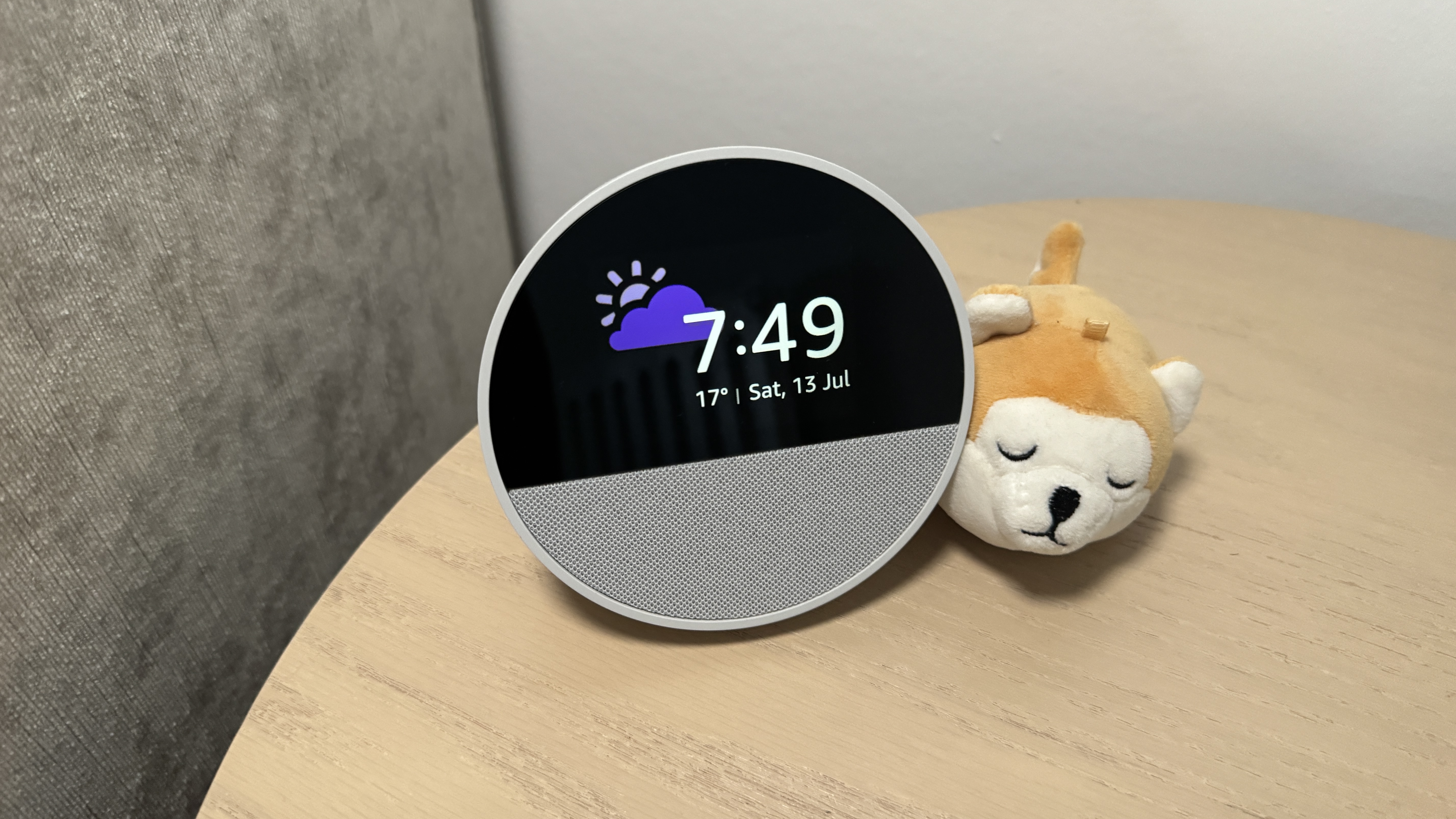
Amazon Echo Spot (2024): Two-minute review
Seven years on from the release of the original Echo Spot, Amazon has surprised fans of its smart home ecosystem with a revival of its smart alarm product line, announcing the Echo Spot (2024) just a week ahead of Prime Day 2024.
Amazon is known for making some of the best smart speakers, but the original Echo Spot was discontinued just two years after release with little fanfare from Amazon. The new model differs from its predecessor in a few key ways, and elsewhere we’ve compared the original Echo Spot and the Echo Spot 2024 in detail.
For one thing, the original had a camera, video-streaming capabilities, and a 3.5mm audio jack, as well as a quirky round screen that really gave the device personality and played cleverly on its clockface inspiration.
The new model, on the other hand, feels a lot more streamlined, resulting in a lower list price, and offers improved audio quality and some fun customization options for its now-rectangular 2.83-inch display, as well as a more contemporary design and connectivity specs (although annoyingly it doesn’t offer a built-in Eero Wi-Fi extender like other devices in the Echo range).
I really want to love the Echo Spot (2024), and I think I would if its price didn’t feel so inflated for what you’re getting. I’m not upset to see the removal of its built-in camera, which felt out of place in a bedroom-based device, nor am I too bothered by the lack of video-streaming support.
However, its rethought design, while appealing, is missing the fun and character of the original, and the display is far too limited overall. The viewing angles aren’t great, especially from the side, and the fact that the screen doesn’t fill the top half of the ‘clock face’ makes the whole thing feel cheap and unfinished.
Jabra Elite 10 Gen 2 review: Price and release date
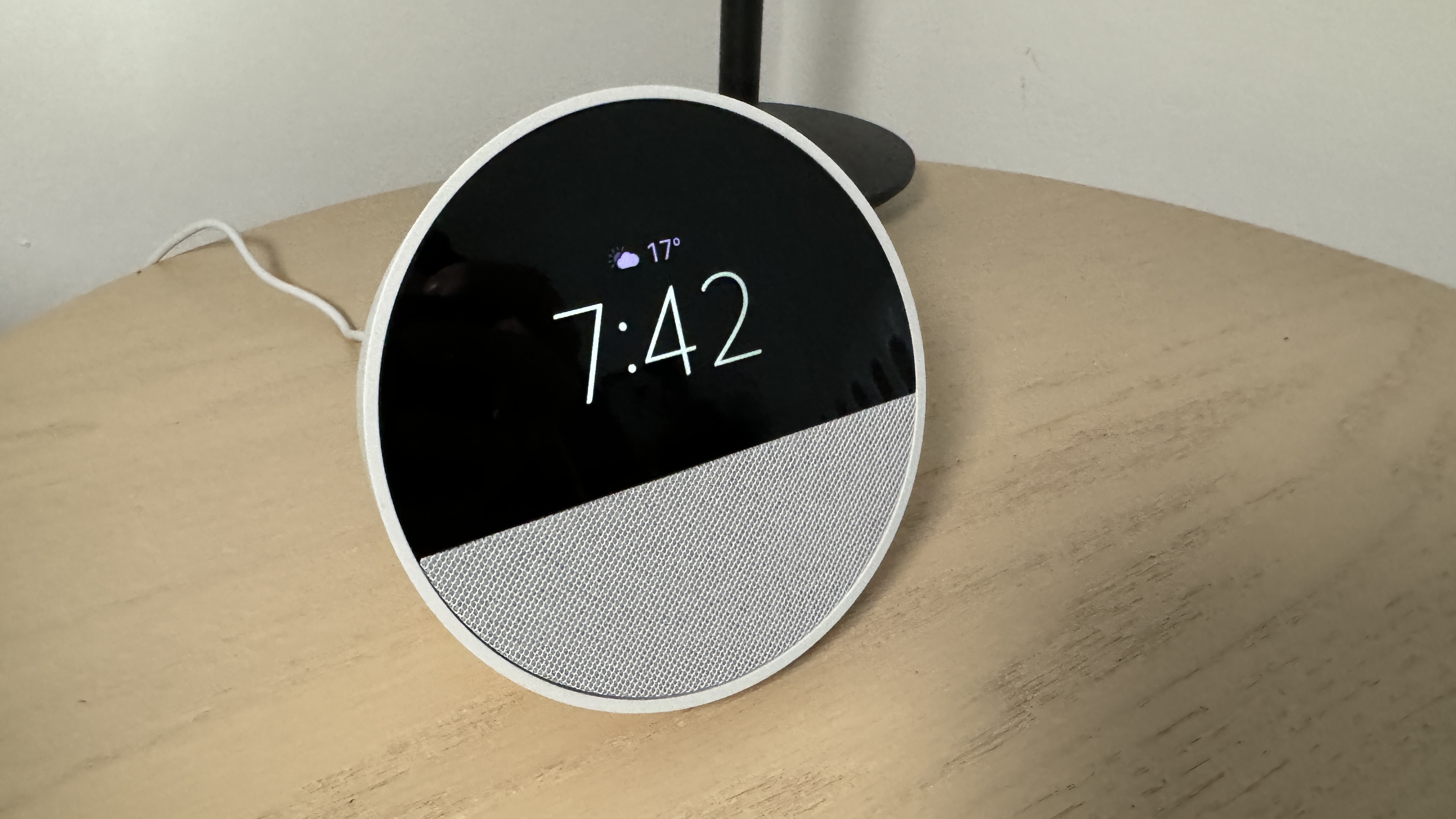
- List price: $79.99 / £79.99 / AU$149
Launched just ahead of Amazon Prime Day 2024, the newest Echo speaker is priced at $79.99 / £79.99 / AU$149, which makes it considerably cheaper than the original was at launch with its list price of $129.99 / £119.99 / AU$199. It’s available in blue, white and black.
That price drop sounds appealing, given there are plenty of similarities between the 2017 original and the new model; however, that drop does come at the expense of the camera (although that’s arguably a good thing, given it’ll be used mostly in bedrooms), video-streaming capabilities and 3.5mm audio jack, as well as the distinctive and appealing round screen.
Given that Amazon is pitching this more as a smart alarm than a smart speaker, I was unpleasantly surprised by the price of the Echo Spot, much as I was by the price of the Echo Pop when I reviewed it last year. The new Echo Spot is an improvement upon the original in many ways, especially its audio quality and more contemporary design. Still, its features, design and performance really don’t warrant the high list price when there are plenty of small, high-performing speakers available at a lower price point; and especially considering that the powerhouse Apple HomePod mini is just $20 / £20 more expensive, and the same price in Australia.
With its release coinciding with Amazon Prime Day we’re seeing immediate discounts on the Echo Spot – it’s available for $44.99 / £49.99 in the US and UK in an introductory deal, which feels like a more reasonable price. Still, it’s frustrating to see the continued trend of Amazon’s devices being overpriced outside of its own major sales.
- Value: 3/5
Amazon Echo Spot (2024) review: Specs
Amazon Echo Spot (2024) review: Design
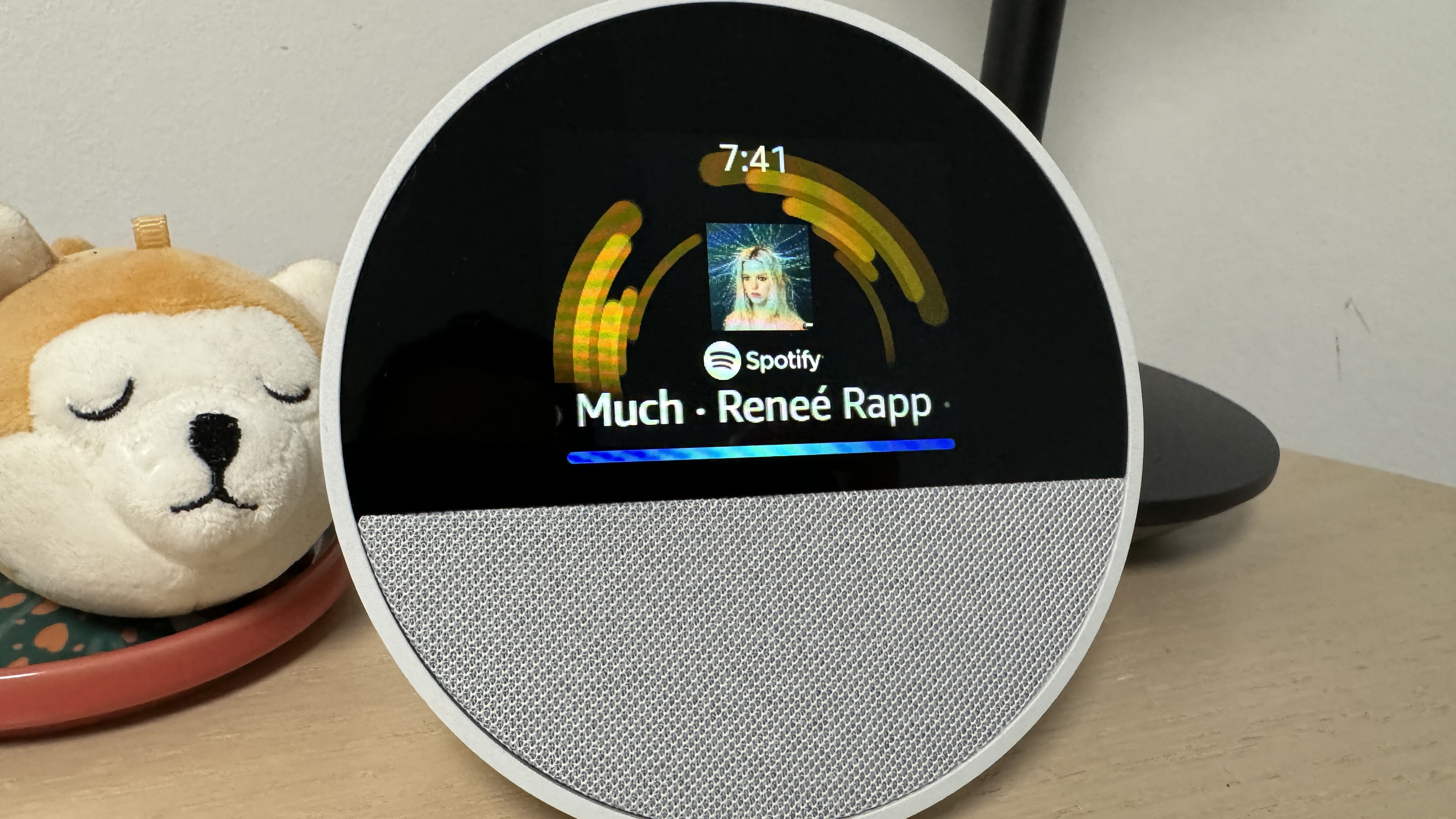
- Three control buttons for volume and microphone control
- Stylish semispherical design with bright and vivid 2.83-inch screen
- No 3.5mm port, no camera
Amazon has hearkened back to the original in the Echo Spot (2024)’s angled, semi-spherical design, but with a few modernizations that result in a chic and clean look that’s a lot more contemporary than the quirky original.
The new Spot measures 113 x 103 x 111mm, making it a little larger than the original (104 x 97 x 91mm). Where the original featured a round 2.5-inch display on the device’s clock face with a 480 x 480 resolution and a thick bezel, the 2024 model has a rectangular 2.83-inch 320 x 240 resolution display that occupies most of the top half of the face, while the bottom section’s speaker grille is home to the 1.73-inch forward-facing driver, and is encircled by the thin bezel of the device’s plastic casing. There’s a motion sensor at the very top of the face.
Broadly speaking, the glossy top half and display make for a classy and attractive clock face, but it’s disappointing that the display doesn’t occupy more of the top half – especially given that you’ll often catch a glimpse of its rectangular edges.
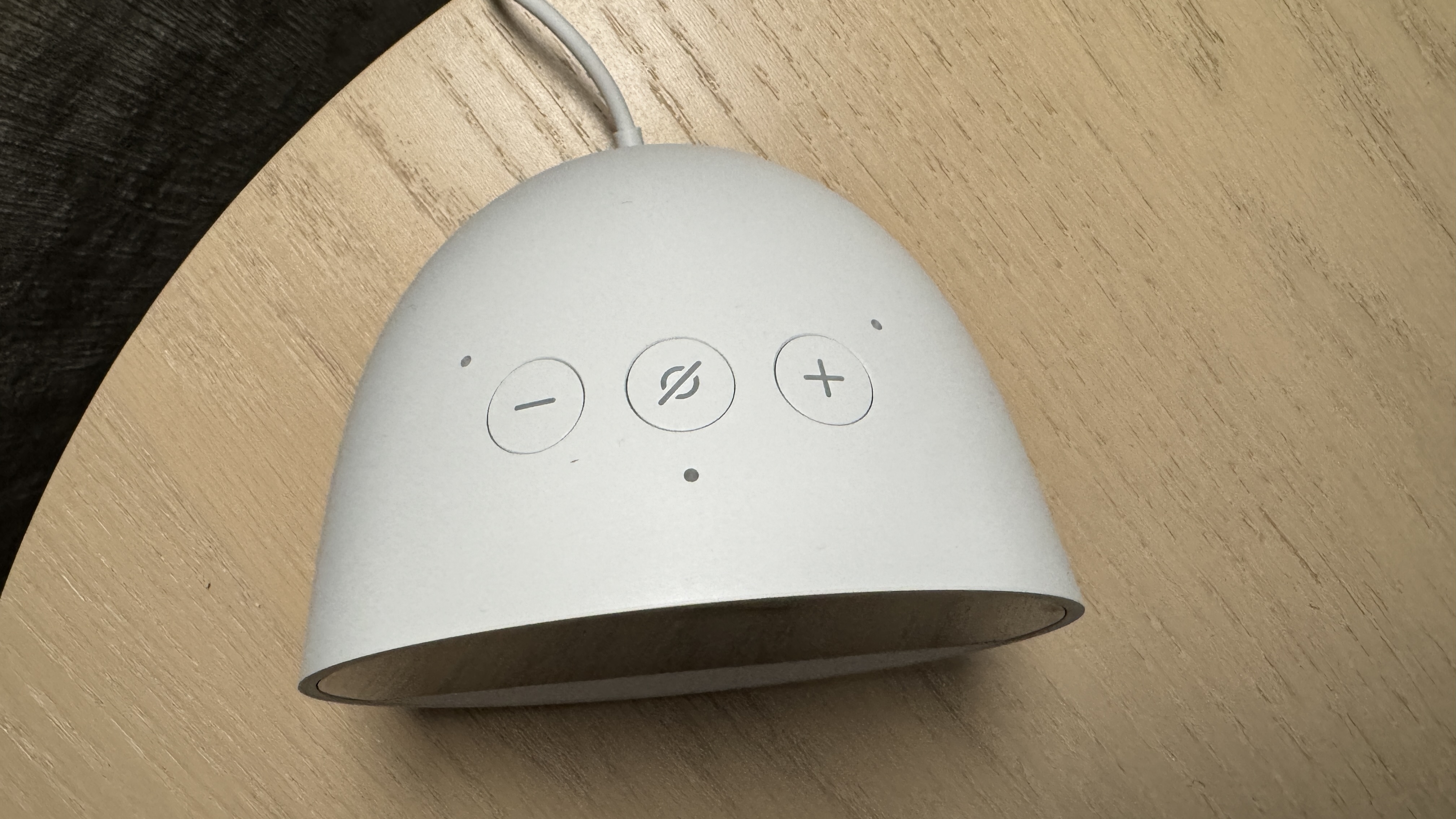
On top of the device are three buttons for controlling the volume and toggling the microphone on and off, as is standard on most Echo speakers, as well as a pair of microphones. As a daily snooze-smacker I was initially disappointed that there was no snooze button, but – to my delight – you simply need to tap anywhere on the top of the Echo Spot (2024) to temporarily silence the alarm. At the rear is the power port, and the flat base is steadied by a rubber foot to stop it from slipping no matter how hard you hit ‘snooze’.
Overall, I think the redesign is largely effective. It takes the Spot from being a quirky product with a neat gimmick to something that feels a little more sophisticated and at home in non-techy households – but in doing so, the Spot loses much of the original’s charm. Still, it’s a more mature look and feel that befits its larger size and more slick display, and it looks wonderful in the white colorway I received for testing.
- Design: 4.5/5
Amazon Echo Spot (2024) review: Display and features
- Fun and vibrant customizable clock face
- …but the viewing angles aren’t the best
- Lacks features and functions from the wider Echo line and original Spot
As with all devices in Amazon’s Echo lineup, the Echo Spot (2024) houses the brand’s voice assistant, Alexa, and as such is designed to be mostly used hands-free. Under the hood is the same MT8519 processor as in the Echo Dot 5th Gen and Echo Pop, meaning Alexa’s responses are fairly zippy but still a little slower than on the standard Echo. The Echo Spot (2024) is also Matter-compatible but unfortunately doesn’t work as an Eero Wi-Fi as other Echo devices can.
There’s also no temperature sensor as on some other Echo devices to help create temperature-based automations, but a motion sensor on the clock face will allow for motion-based automation mapping, such as turning on your smart lights when you enter a room and turning them off when no motion has been detected for a given amount of time. Unlike on the original Echo Spo, there’s no camera in the newer model; however, the idea of having an inbuilt camera in a smart device designed for use in bedrooms never quite sat comfortably with me.
Broadly speaking, the screen is discreet in its semicircular housing, blending fairly seamlessly with the black glossy surface surrounding it; however at certain brightnesses and angles its rectangular borders become very clear, spoiling the effect somewhat. At the time of writing, there are no ads on the Echo Spot, but as with any service-based product you have to keep in mind the possibility that the service provider might at any point change the rules of engagement, whether that’s by gutting software or removing key perks unless you pay for a subscription.
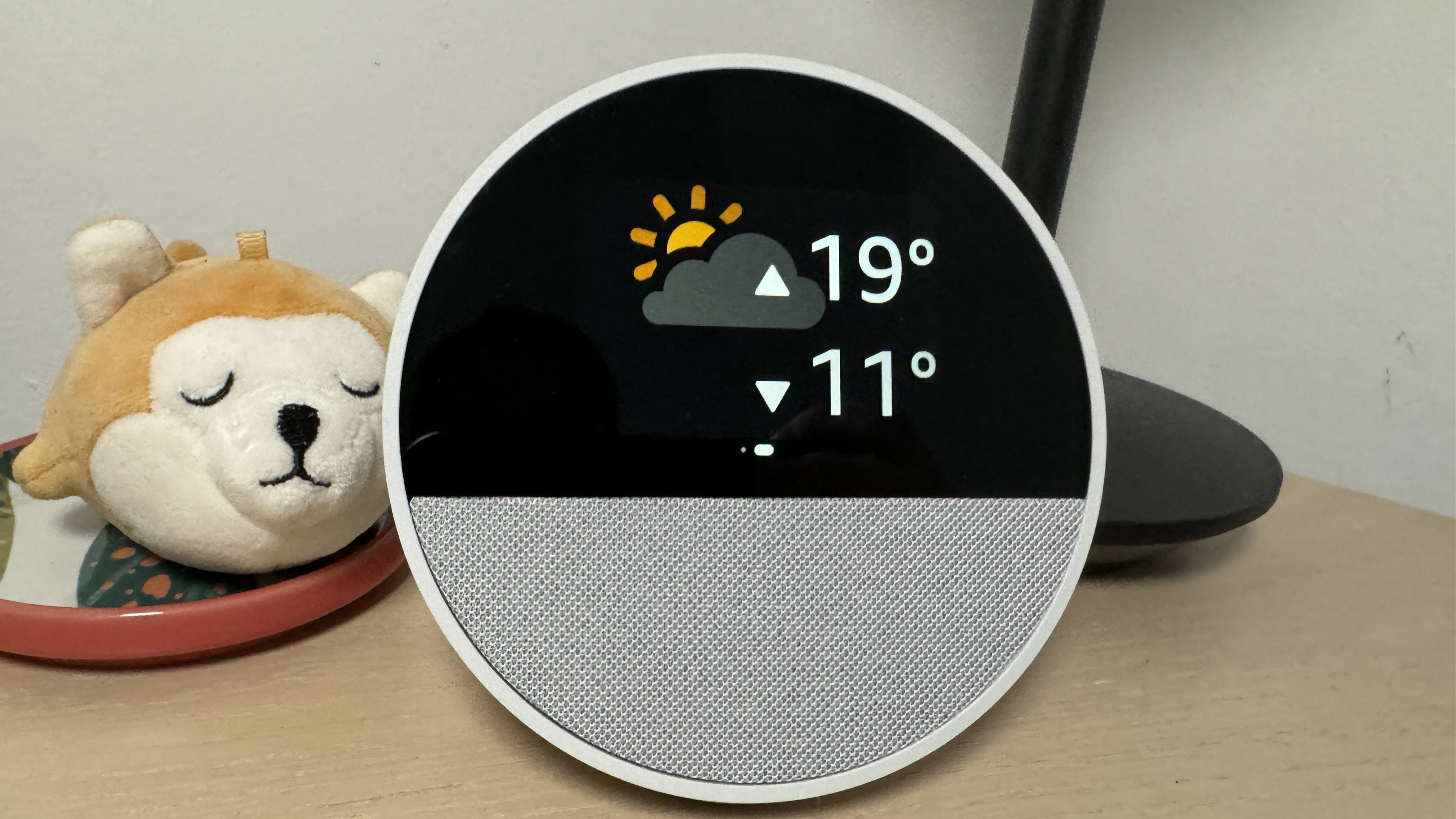
The real standout is the Spot’s 2.83-inch touch display, which primarily services as a clockface. It’s sharp and smooth, even at its size and middling 320 x 240 resolution. There are six customizable animated clock faces in six different color themes available in the Alexa app, along with four new alarm sounds, giving you some freedom to express yourself with the Echo Spot.
The screen will also display different visuals depending on your queries; I particularly enjoy the music visualizer and weather animations, which feel a lot more understated and finessed than Amazon’s usual cluttered screens (I’m looking at you, Echo Show 5). There are also a handful of widgets for other functions like smart home control, including a brightness slider for smart lights.
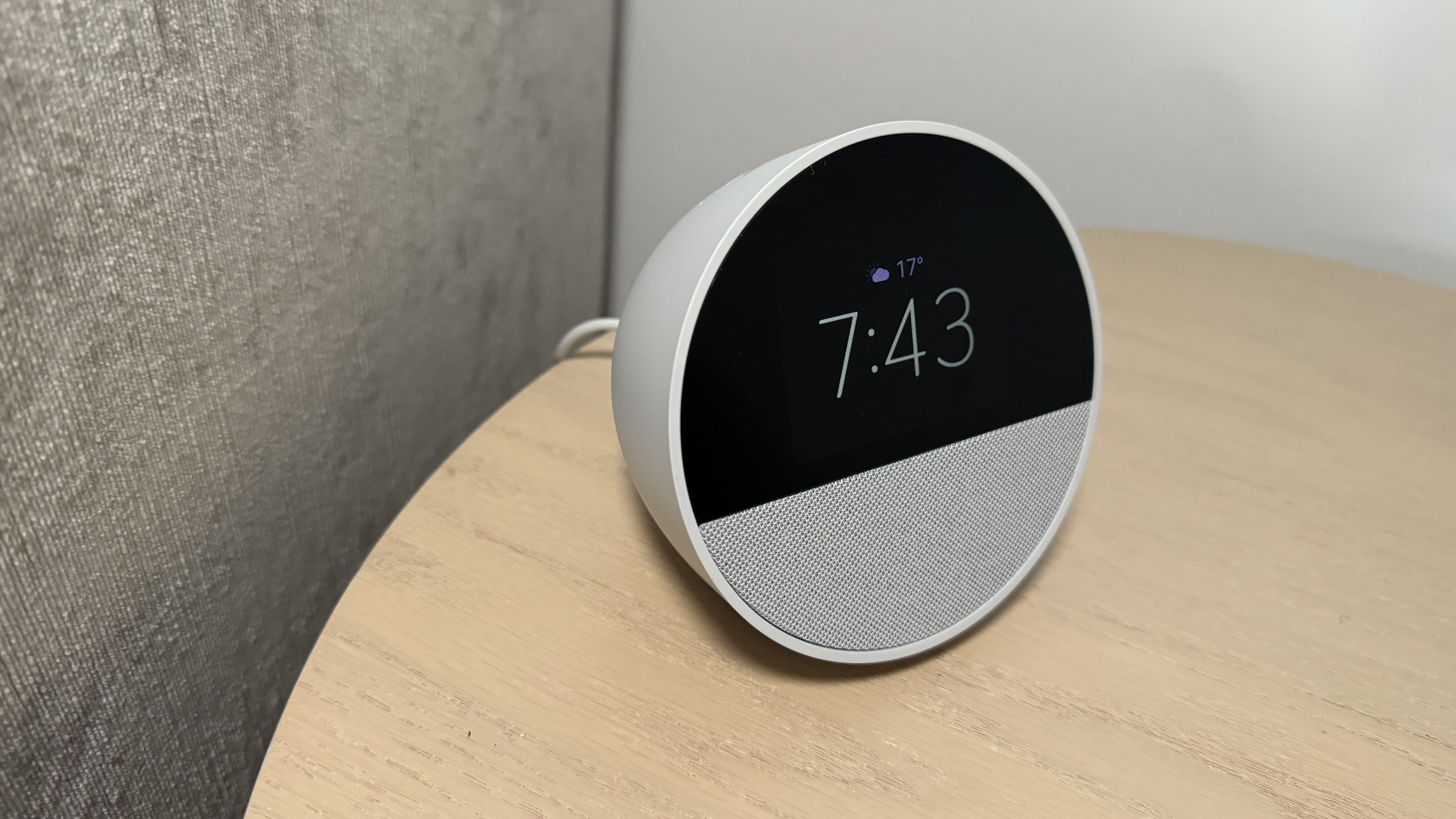
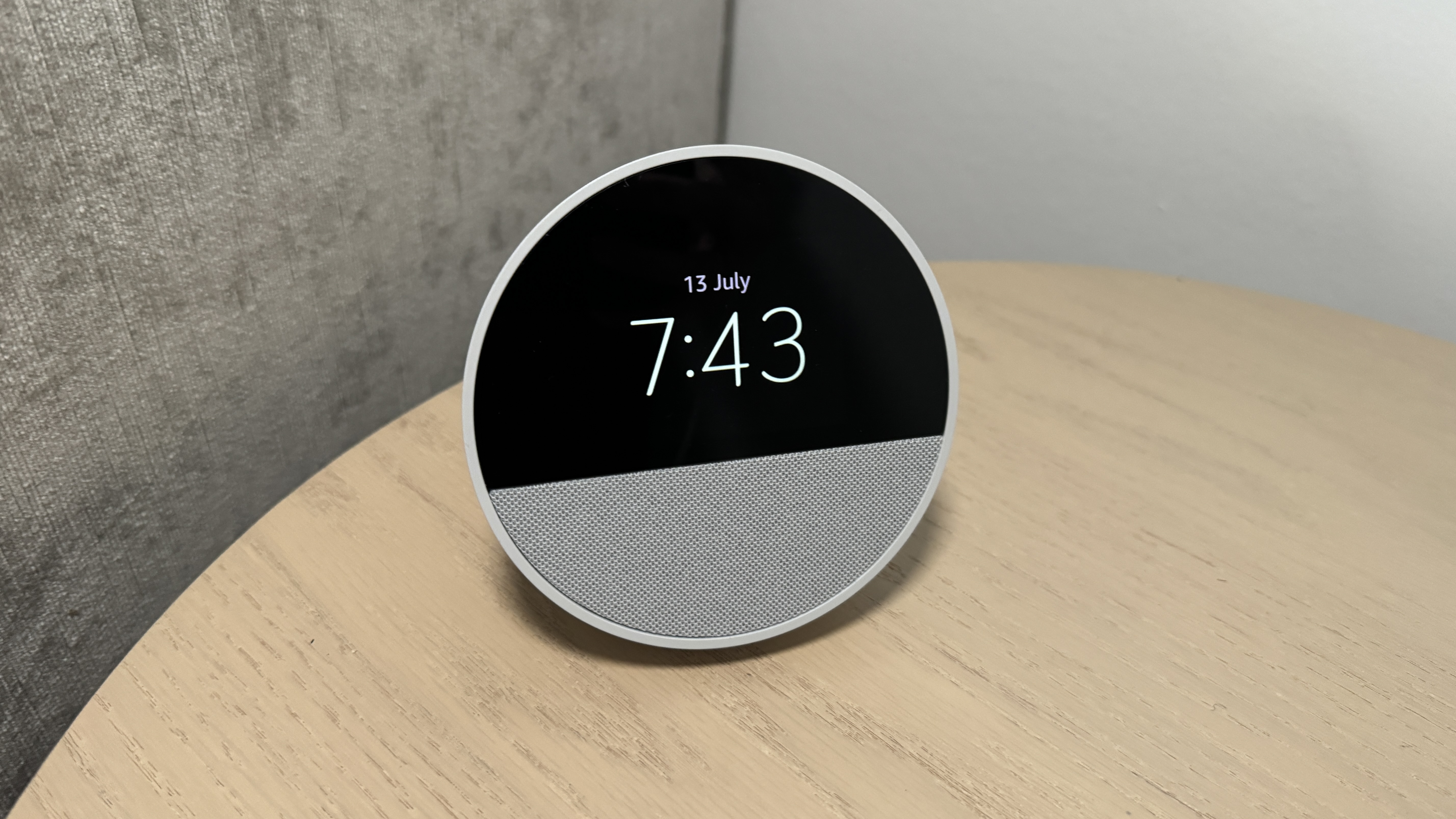
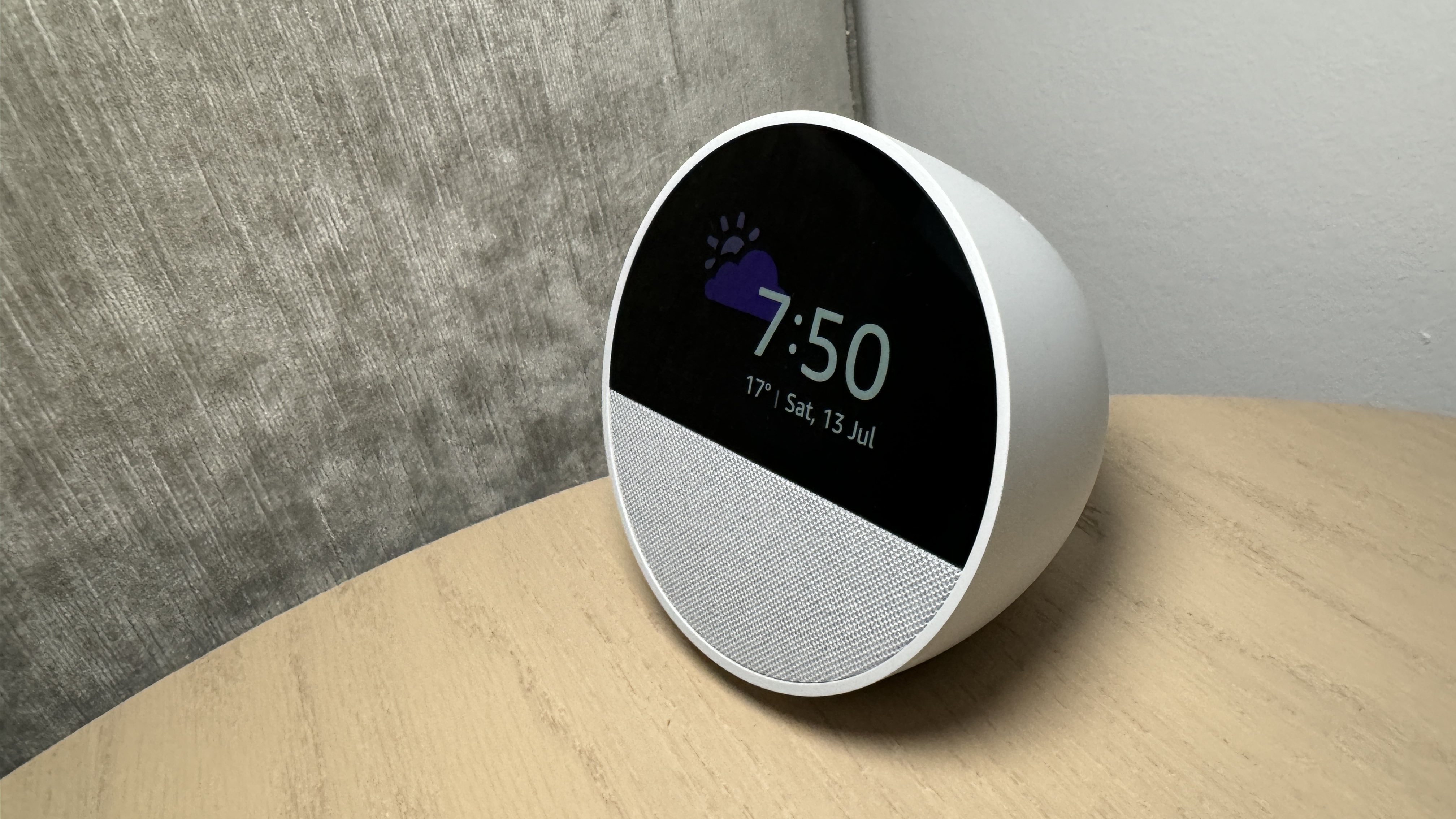
The screen is fairly bright, at least when viewed straight-on, but it’s a little hard to read if you’re at an angle to it, which will likely frustrate in larger rooms; mine lives in the corner of my bedroom, and I have a pretty good view of the screen at all times. With night mode activated (either manually or by setting a schedule), the display switches to a dark mode and the colors are muted, and you can also toggle settings like Do Not Disturb from within the Alexa app.
For me, it’s no great issue that the Echo Spot (2024) doesn’t offer video streaming or video calls, but I am disappointed that it doesn’t show video feeds from the best video doorbells. I appreciate that the Echo Spot isn’t intended to be one of the best smart displays, but there are some very simple and useful features, like recipes and location information, that l’d like to see added in the future – and I for one would like to know if whoever’s knocking at my door is worth getting out of bed for. The Echo Spot does, however, support voice calling.
- Display and features score: 3.5/5
Amazon Echo Spot (2024) review: Sound quality
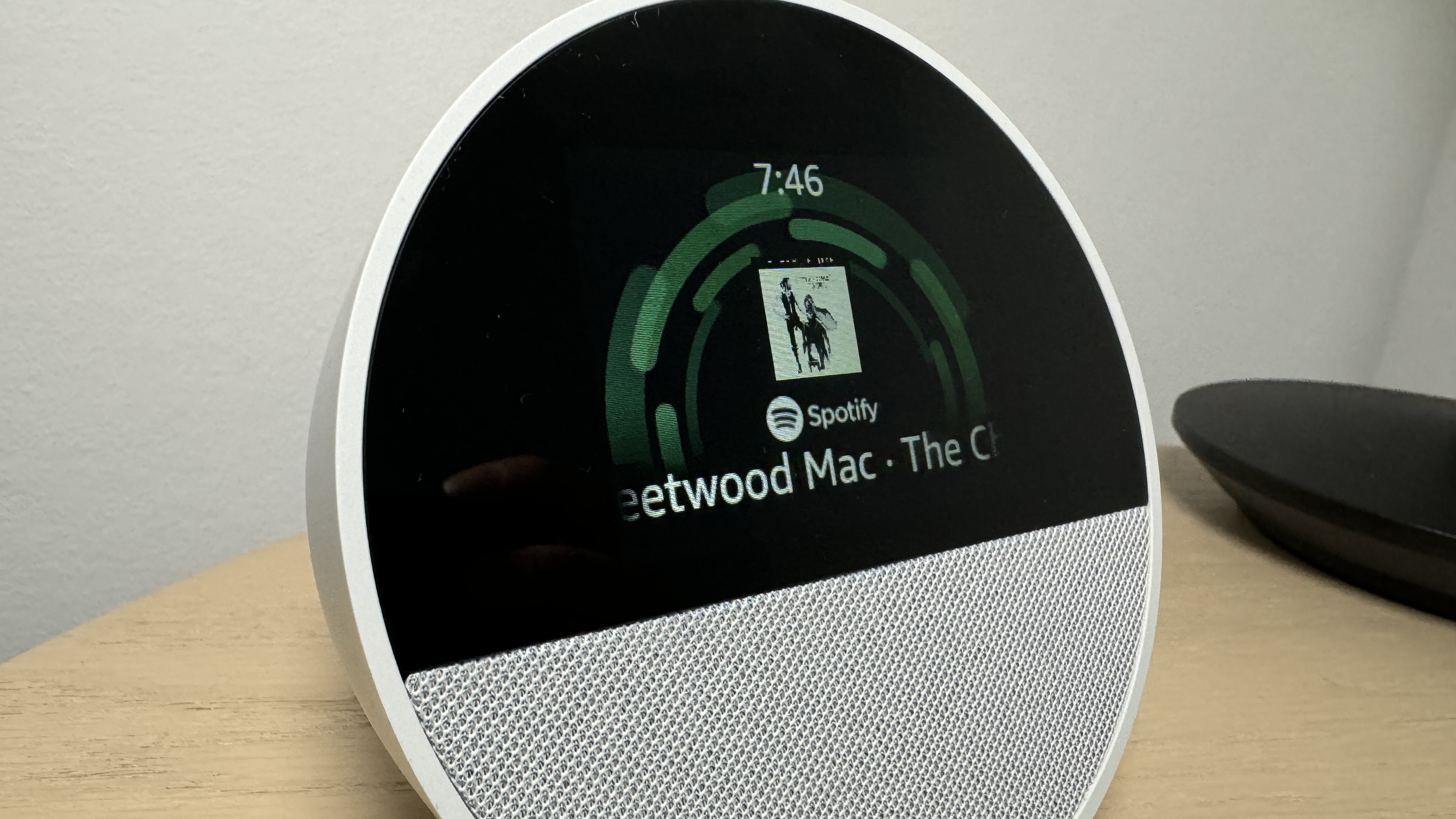
- Decent audio for its size
- Struggles with complex textures and mids
- Great for spoken-word
While Amazon is branding the Echo Spot as more of a smart alarm than a smart speaker, that’s not to say you can’t reap the benefits of its 1.73-inch speaker and listen to some of the best podcasts, best music streaming services, or other audio broadcasts using the best Alexa Skills and commands.
As long as you’re in front of the Echo Spot (2024), as its speaker is front-facing, you can enjoy the improved audio quality compared to the original Echo Spot. This is definitely not a party speaker, and nor is it for audiophiles, but that’s generally to be expected from smaller speakers. You can expect a decent audio performance overall, though; Alexa’s voice cuts through crisply and cleanly, and in general spoken-word audio sounds very pleasant, which is good news if you’re a podcast-lover.
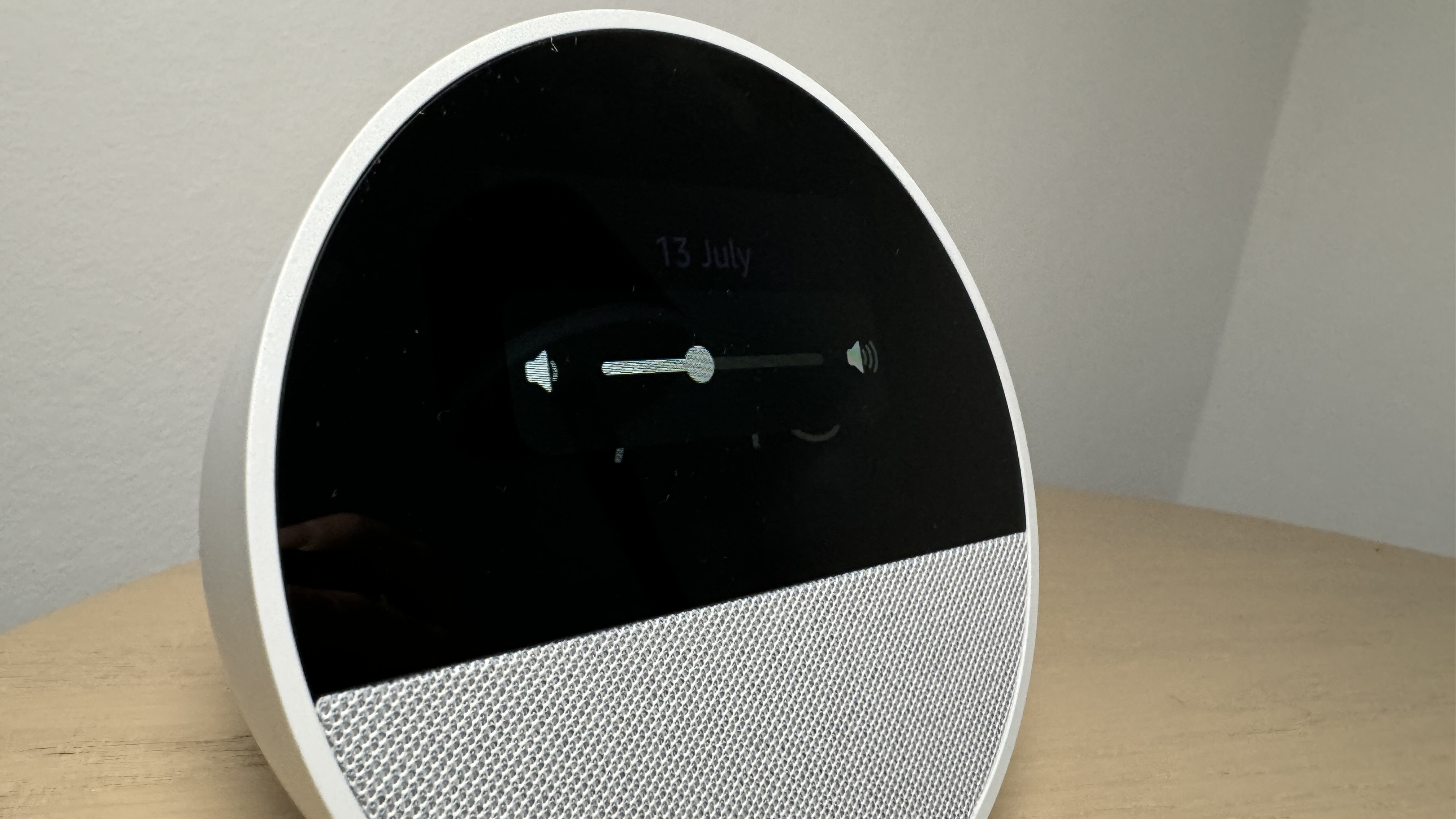
For music, the Echo Spot offers an energetic sound that’s impressive for its size, but not without fault. Without tweaking its equalizer settings in the Alexa app, the bass is fairly dominant, but lacks depth; Fleetwood Mac’s The Chain sounded hollow without its thumping rage and resonance, and the opening bass line of Led Zeppelin’s Dazed and Confused lacked its evocative trudging, bluesy depth.
The mid-range often becomes muddied, with pieces like Hans Zimmer’s Time from Inception sounding uncharacteristically unbalanced, while tracks like Radiohead’s 15 Step feel fuzzy and sluggish, with the Echo Spot (2024) unable to reproduce the track’s crisp and rich textures.
As highlighted above, none of this is really a surprise given this speaker’s size, but it’s worth noting if you’re passionate about hi-fi. Much like many of Amazon’s smart speakers, the Echo Spot is best enjoyed at low-to-mid volume, as from 70-80% volume and above it begins to distort.
- Sound quality: 3.5/5
Should I buy the Amazon Echo Spot (2024)?
Buy it if…
Don’t buy them if…
Amazon Echo Spot (2024) review: Also consider
How I tested the Amazon Echo Spot (2024)
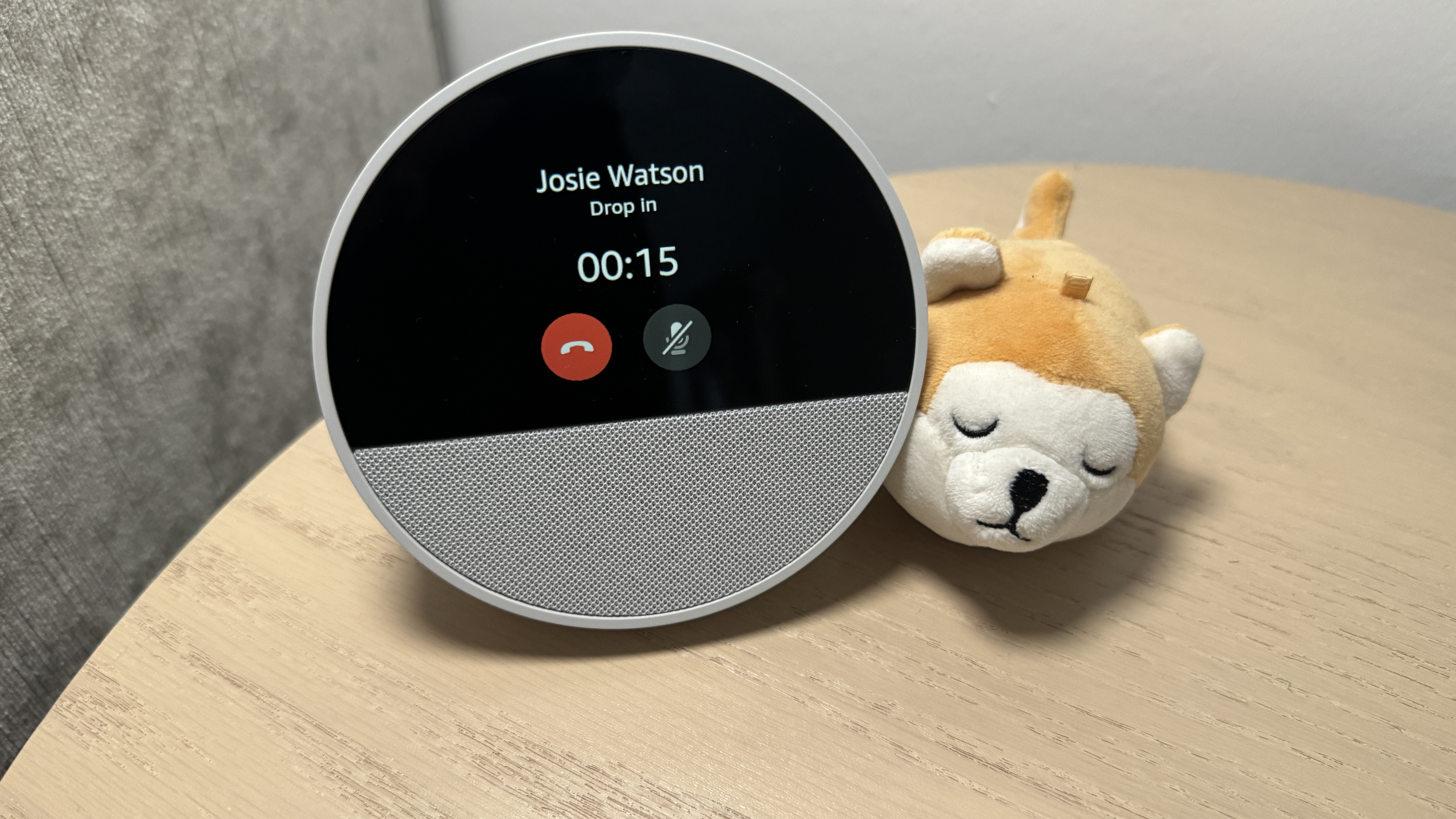
- I tested the Echo Spot for a week
- I used it as part of my Alexa-based smart home set-up, testing all of its features, functionalities and companion software.
- I used it to play music, set alarms, control my smart home, and as a main voice assistant
To put the Amazon Echo Spot (2024) through its paces I used it as my main smart home speaker for a week; and given that I’m both constantly using smart home devices for work and chronically lazy enough to lean on voice control, that means a lot of testing.
I used all of its key features to test how well the device measured up against its marketing, ensuring that the audio, speed, voice controls and display all performed as expected. I compared it to the Amazon Echo Pop and Echo Show 5, as well as the Apple HomePod mini, to see how well it stacked up against the competition, as well as referencing it against TechRadar’s coverage of some of the best smart home devices.
I’ve been testing smart home devices for two years, but I’ve been an enthusiast for far longer. When testing tech, I try to consider not just the specs, but the lived experience I have with different devices, using this and my market knowledge, as well as a keen sense of value for money, to inform my opinions.
- First reviewed in July 2024







